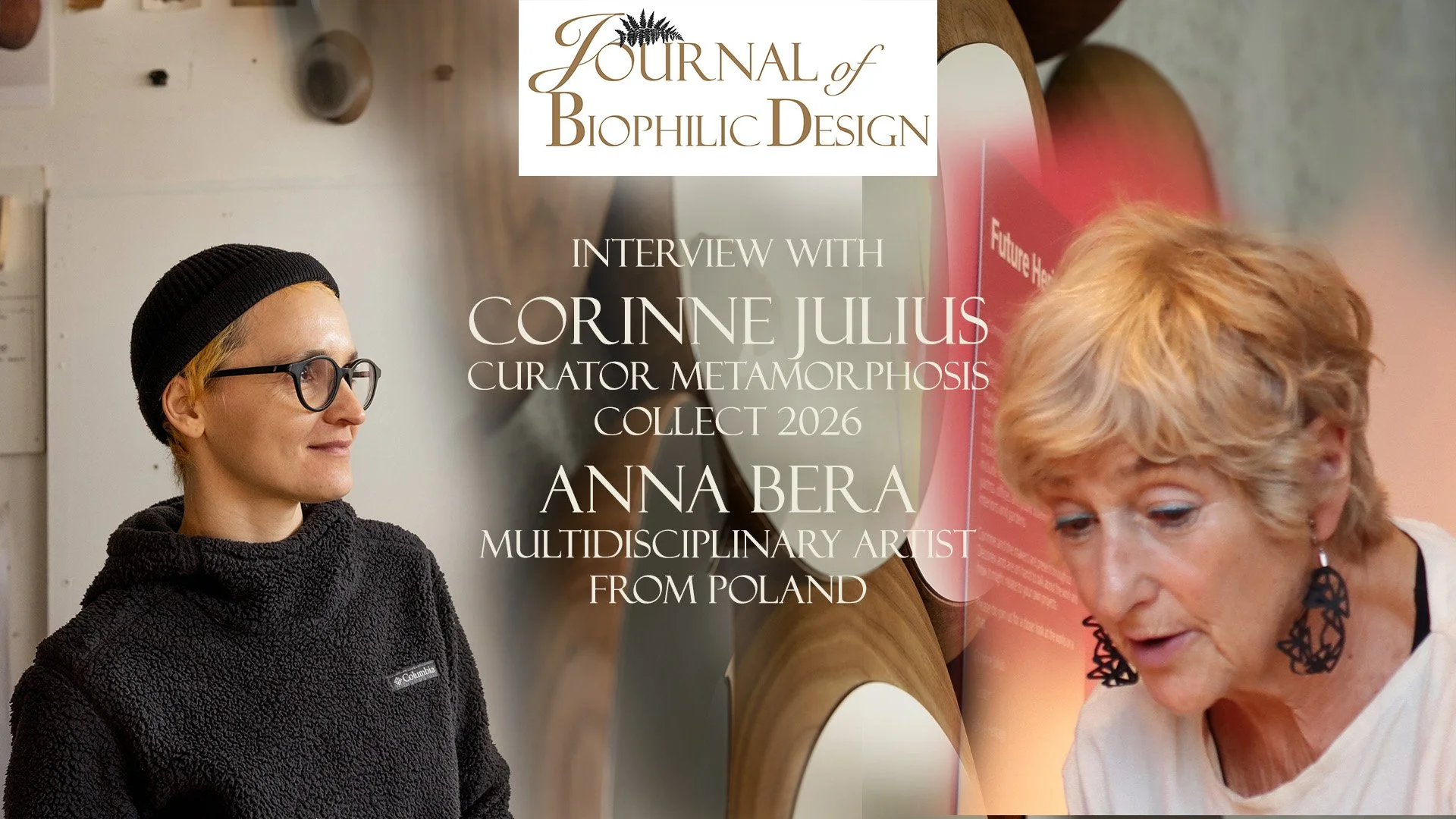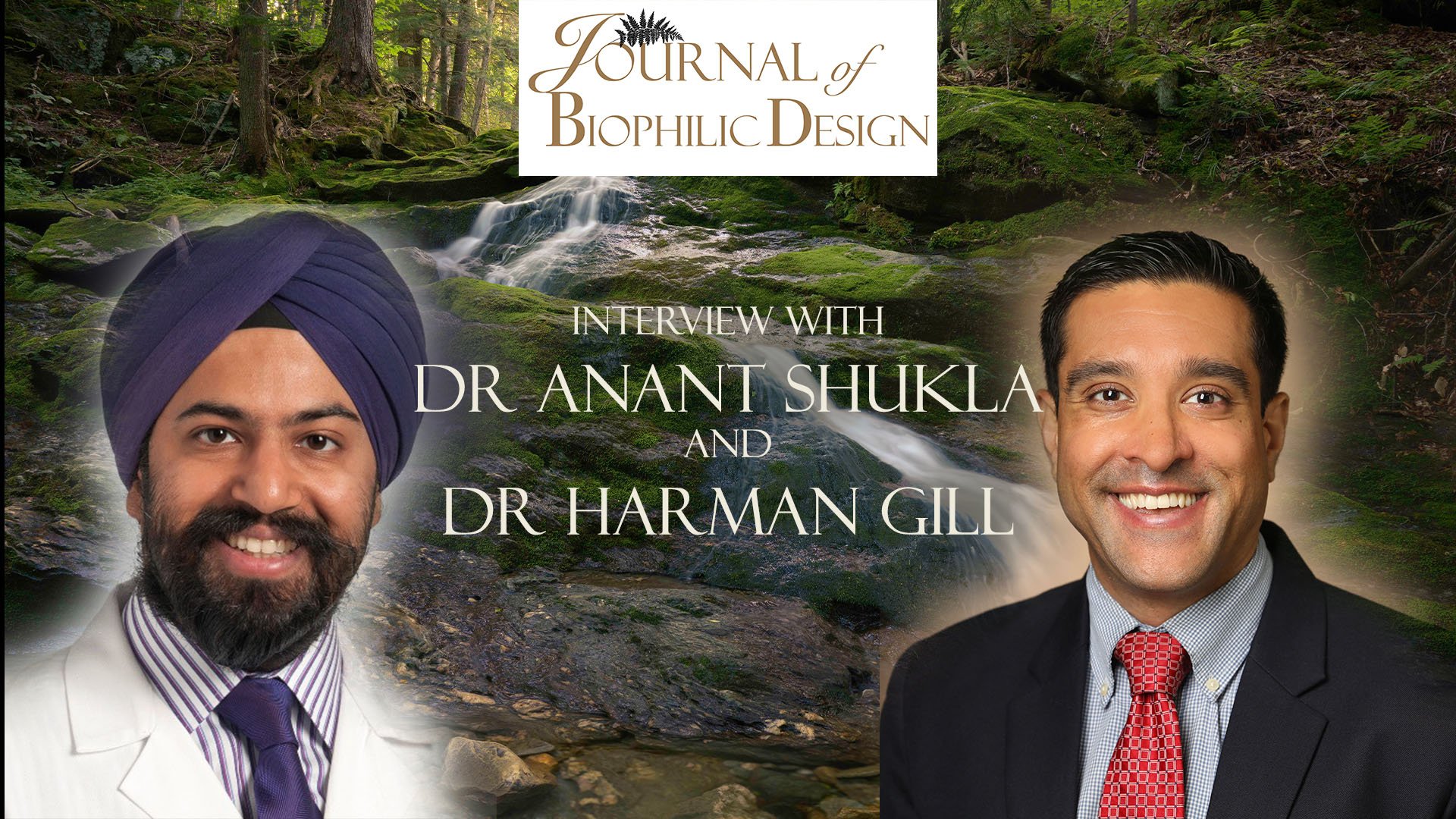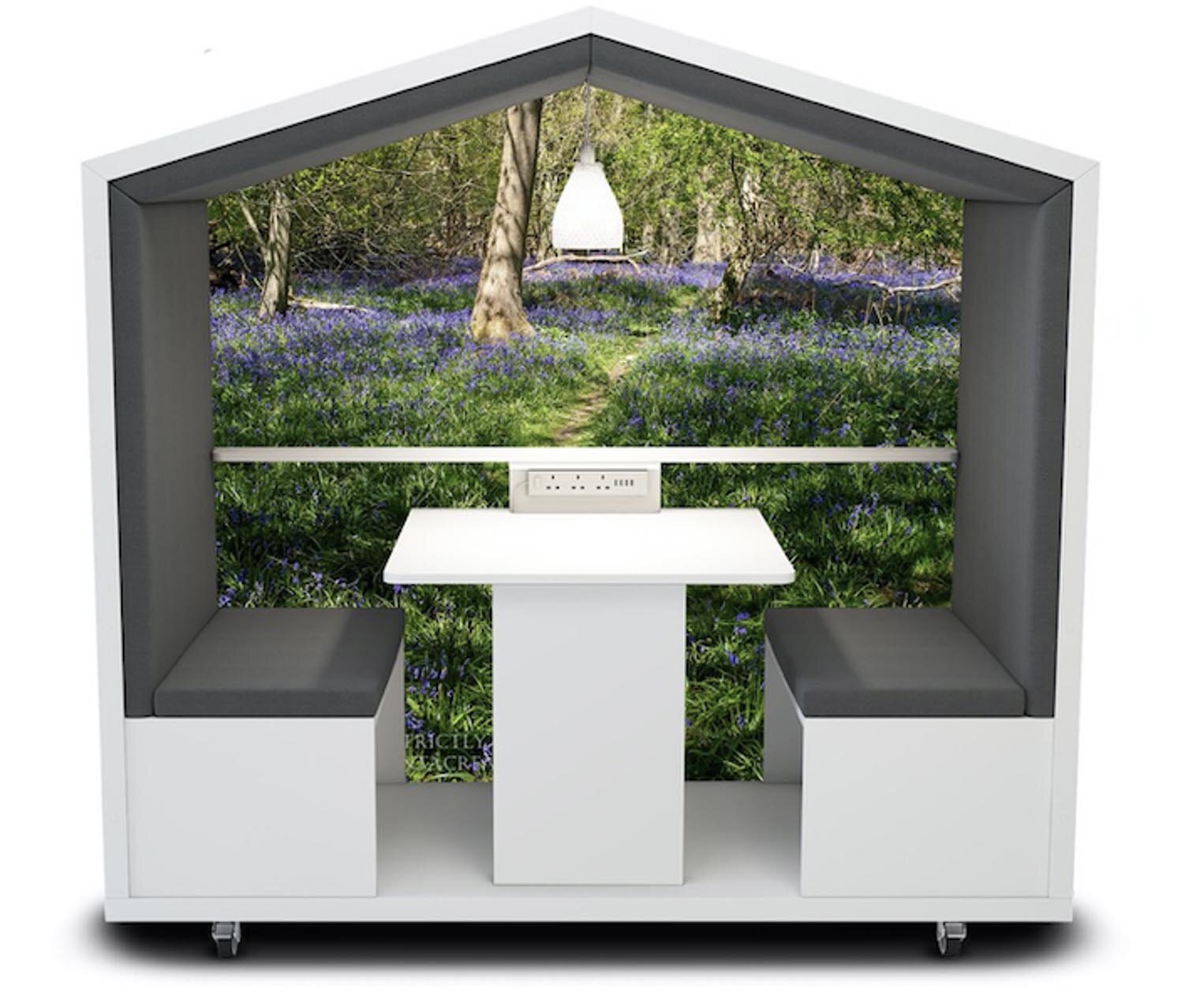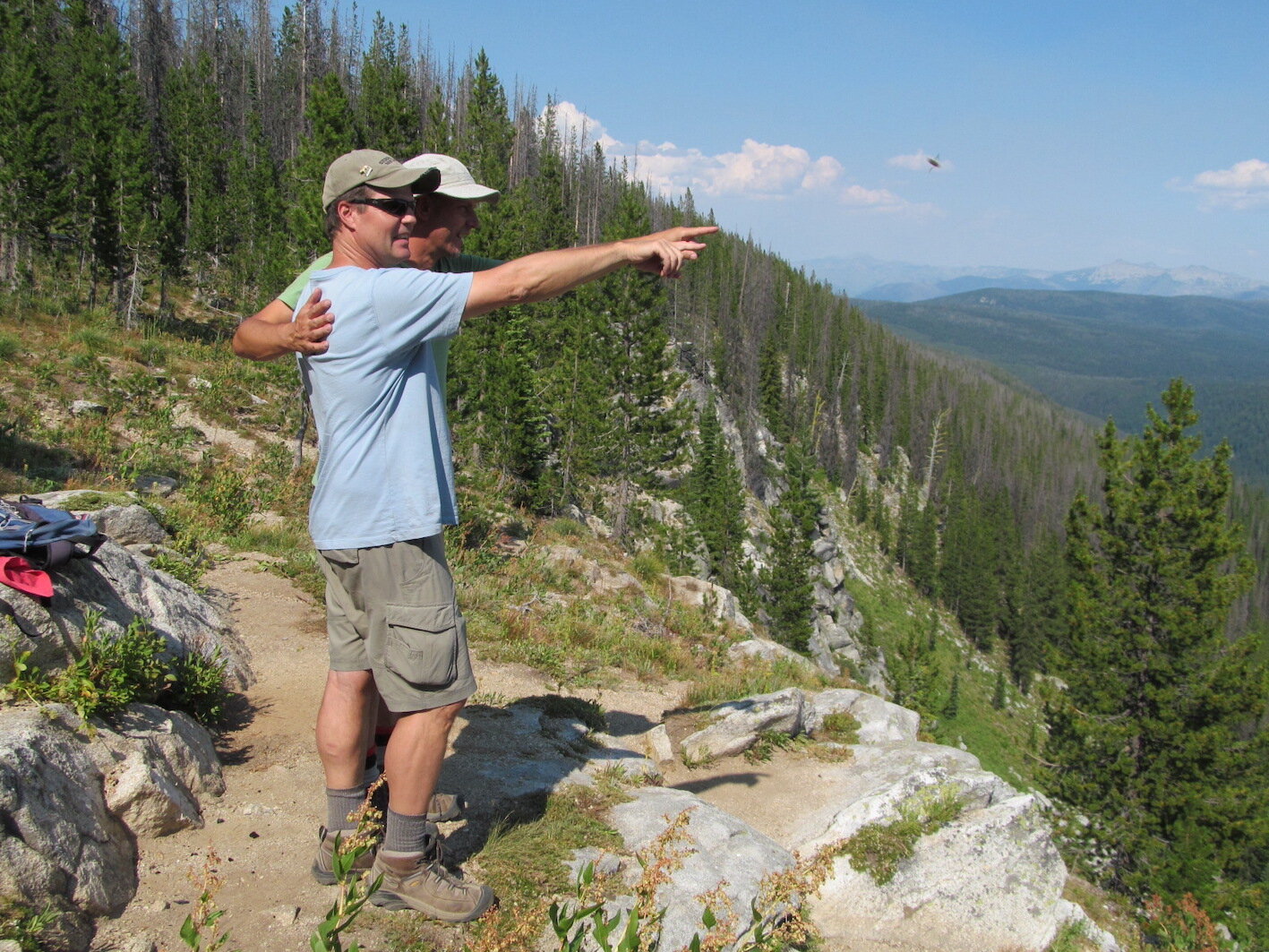Polish craft and innovation is going to take centre stage at Collect 2026 which opens in London on 25 February this year 2026. Nature connection, craft and design is taking centre stage. Biophilic Design helps people reconnect with nature. I am also a maker and artist (I sculpt, weave, sketch, etc), and for me, creating things with natural materials gives me a direct connection to nature and our planet. In this podcast we speak with the curator of this year’s Collect Corinne Julius and one of the Polish artists featured during the show. We explore the significance of biophilic design, the metamorphosis of Polish craft, and the role of materiality in art. The conversation also touches on the challenges of the craft industry in the context of climate change and the importance of tactile experiences in our lives. Can slow craft be the antidote to the disconnection and environmental crisis we face today?
One minute to breathe. How images of nature can help save our A&E staff
Emergency departments are some of the most punishing workplaces in healthcare. Clinicians move in seconds from breaking catastrophic news to families, to resuscitating a dying patient, to reassuring a parent whose child has a simple fever. We rightly talk a lot about patient experience. We talk far less about what these relentless environments do to the people who work in them.
New research published in Issue 18 of the Journal of Biophilic Design, proves that after just one minute of viewing nature imagery, clinicians felt less anxious, less gloomy and calmer and at ease, in a way that is extremely unlikely to be explained by random fluctuation.
If a single minute in front of one picture can move the needle, what might a genuinely biophilic emergency department achieve? READ on and listen to the interview.
Digital Nature. Is your smartphone your Secret Weapon for Mental Health and Healing?
Did you know 10 million people watched the first episode of Planet Earth III – the same number who visit the Peak District annually? We're hungry for nature, even if we can't always access it directly.
Imagine escaping the concrete jungle without leaving your desk. What if your smartphone could transport you to a misty bluebell woodland or the thundering heart of an Icelandic volcano? Welcome to the future of nature connection – where technology becomes your gateway to mental restoration. We speak with environmental psychologist Dr Alex Smalley about his research on virtual nature and Tim Daniels co-founder of Portal, both are names to watch in this beautiful revolution in how we experience the natural world.
"We've always tried to bring nature indoors," explains Dr. Alex Smalley. From ancient cave paintings, ancient Roman wall paintings right through to modern digital experiences, humans have always craved a connection to the natural world.
But this isn't about replacing real nature. It's about expanding our understanding of how we can experience it.
For the stressed-out healthcare worker pulling a double shift, the burned-out student cramming for exams, or the city dweller trapped in a windowless office, digital nature offers a lifeline. Scientific research shows these experiences aren't just pretty pictures – they're powerful mental health tools.
Alex’s research is proving that digital nature can actually change how our brains process pain and stress. In clinical studies, people experiencing virtual natural environments reported reduced pain perception and lower stress levels. It's like a mini-vacation for your brain, available at the touch of a button.
READ on and WATCH THE VIDEO….
Playa Viva - where Biophilia meets Living Ecology
Nestled along Mexico's Pacific coast, David Leventhal's Playa Viva is redefining hospitality through a radical commitment to regenerative design. More than just a boutique hotel, it's a living ecosystem where architecture breathes, nature flows freely, and every material tells a story of sustainability.
Imagine waking in a treehouse suspended among palm trees, with no doors or windows—just an uninterrupted connection to the landscape. This is Leventhal's vision: hospitality that doesn't just minimise environmental impact, but actively regenerates it.
The resort's structures are poetry in natural materials. Bamboo "bones" form parabolic roofs, carefully woven and raised by hand. Shower floors become canvases of meticulously placed pebbles, each stone positioned with artisan precision. Wall pigments are sourced locally—rich oranges and browns extracted directly from mountain landscapes, mixed with unconventional ingredients like hay, horse manure, and even turtle eggshells.
"We're not just building rooms," Leventhal explains, "we're creating experiences that transform how humans interact with environment."
READ on and listen to/ watch the podcast….
This transformation begins with radical design choices. Solar panels provide 100% off-grid electricity. Air conditioning is minimised, with innovative systems like the "Evening Breeze" technology cooling only specific areas. The goal isn't comfort through separation, but comfort through connection.
How to Design a Biophilic Community
Nestled in the Chattahoochee Hills, Georgia, is Serenbe, the biophilic community leading the wellness real estate and agrihood movements. It is a neighbourhood focused on wellbeing, full of fresh food and fresh air. This community is set among acres of preserved forests and meadows with miles of nature trails that connect homes and restaurants with arts and businesses.
Importantly it is a real-world example of Biophilic Design in a community development that can help us reimagine urban and town planning.
We speak with Steve Nygren, Founder and CEO who shares with us his love of biophilia and how this is woven through Serenbe, a beautiful and practical reimagining of how we can live in harmony with nature. More than just a development, Serenbe is a living, breathing testament to Biophilic Design and the profound connection between human well-being and the natural world…
READ on and Watch the interview…
The School of Biophilia
The School of Biophilia seeks to foster a deeper connection between people and the natural environment through a comprehensive and innovative educational approach. By creating accessible, curriculum-aligned teaching resources that seamlessly integrate biophilic principles across different subjects, they aim to make nature education engaging and meaningful for children of all backgrounds. The founders of The School of Biophilia, Ann Vanner and Amelia Chasey, envision a future where biophilic principles are fundamental to education, design, and personal lifestyle choices.
Their approach goes beyond traditional nature activities by developing interactive experiences that encourage children to explore and interact with their environment, even in urban settings. Through methods like nature scavenger hunts, storytelling, and carefully designed workshops, they help children understand not just the what, but the why of their connection to nature.
A key aspect of their mission is making biophilic education inclusive and available to all children, regardless of their school's resources. By providing digital downloads, lesson plans, and workshops that can be easily implemented, they ensure that every child has the opportunity to learn about and appreciate the natural world.
They want to make biophilic principles accessible to all children, not just those in privileged schools. They highlighted a shocking statistic that current UK children spend less time outdoors than prisoners, which they see as a critical issue to address. Teaching children that humans are part of nature, not separate from it is a vital key to encouraging awareness and respect of our natural world (and each other). By breaking down educational silos and encouraging collective, community-based learning, The School of Biophilia aims to help children understand our interconnectedness with natural systems. READ ON AND WATCH THE INTERVIEW….
Charlotte Church - The Dreaming
Reconnecting with Nature: Charlotte' Church’s Biophilic Retreat offers Healing and Wonder. The Elan Valley, nestled in the heart of mid-Wales, is a hidden gem of serene beauty and wild grandeur. Here, the landscape unfurls in soft, rolling hills, dotted with ancient woodlands and heather-clad slopes, while the deep, verdant valleys are carved by the meandering course of crystal-clear rivers. The air is fresh, tinged with the earthy scent of moss and pine, and the sky, often painted in hues of blue or grey, seems endless above this tranquil expanse.
Here is where The Dreaming is.
The Dreaming, which is a haven and a place of retreat for everyone, is the creation of Charlotte Church. Charlotte. Is known to many as a singer, but maybe fewer know her as a visionary of this beautiful space in Wales. It’s a place where she is manifesting her vision to help people reconnect with nature, both inside and out, where biophilia threads through the hills, waterfalls, valleys and right into the house where you stay.
And it is this house which is the epitome of Biophilic Design. It is designed not only with heart and honesty, but has been a work of love by Charlotte and the designers who helped create this home. The former home of the designer, Laura Ashley has fallen into disrepair when Charlotte came across the land.
Turning her desire to make a difference in the world for people and planet, the land informed her decision to create a retreat centre, transforming the land and the house into a Biophilic haven.
In a secluded corner of the Welsh countryside, internationally renowned singer-songwriter Charlotte has created a sanctuary that blends the power of nature, music, and design. The Dreaming, her newly opened retreat centre, is a testament to her lifelong passion for the restorative qualities of the natural world.
Reconnecting with Nature: The Biophilic Design Revolution
In an age of increasing urbanisation and digital distractions, a growing movement is seeking to reestablish our innate connection with the natural world. At the forefront of this revolution is Martin Brown, a sustainability consultant and self-proclaimed "provocateur," who is challenging the way we design and inhabit our built environments.
Martin recounts his own journey, one that has seen him transition from a career in project management to becoming a leading voice in the world of regenerative design. "I think biophilia, rather biophilic design, was that sort of gateway to try attract more people and gain attention," he explains, describing how simple biophilic elements, such as living walls and textured wood panelling, can have a profound impact on both the occupants and the bottom line.
But Martin's vision extends far beyond mere aesthetic improvements. He speaks passionately about the concept of "kinship," a deeper, more spiritual connection to the natural world that draws inspiration from indigenous philosophies. This shift in mindset is essential if we are to address the pressing environmental and social challenges of our time. He laments the "disconnect" he observes in modern society, where people are quick to marvel at the "pretty lights in the sky" but equally quick to discard their litter.
How our Brains respond to Biophilic Design
In a world increasingly disconnected from nature, the principles of biophilic design offer a powerful antidote.
Chintamani Bird, an Australian designer committed to biophilic design, shared her insights on how Biophilic Design can heal both people and the planet. She emphasizes that biophilic design has a profound impact on the brain, reducing stress, improving cognitive function, activating the parasympathetic nervous system, and enhancing overall mood and well-being.
As the Journal of Biophilic Design expands to Australia in 2025, this is the first in a series of interviews with leading names in Biophilic Designers from that side of the globe and who champion the transformative potential of this design philosophy.
At the heart of Biophilic Design is the recognition that humans have an innate need to connect with the natural world. "Biophilic design has the opportunity to heal and heal through biodiversity, heal the soil, heal the environment, heal communities," Chintamani emphasized.
Listen and Read on...
The Wave - Connecting us to our Blue Mind
Tying in with Issue 6, our Blue Mind edition of The Journal of Biophilic Design we speak with Nick Hounsfield, Founder and Chief Visionary Officer at The Wave in Bristol. The Wave is an inland Surfing destination.
After working in the healthcare sector and realizing that not only one of the key aspects for people was that they were lonely but that they also were missing a connection to nature, Nick wanted to create something at scale that would have a positive impact. He also wanted to reach out to people who didn’t have access to a private healthcare system.
“How can we democratise this? How can we make it more accessible for more people?” Nick explains how he went on to create The Wave. He had a very clear purpose and mandate, wanting to appeal to everyone, be accessible in all seasons and ensuring he addressed barriers to accessing to green and blue space. “We have to break down those barriers through design, through great landscaping, a good business model, and also make sure that we're not destroying the planet and local ecology either.”
Healing yourself at Home with Biophilic Design
Tying in with the second issue of our magazine, our theme for this podcast is HOME. We speak with Award-winning Interior Designer Nuria Muñoz who tells us about her journey into Biophilic Design and why she decided to follow her dream path start her own company and do something good for the planet.
Nuria is a Wellbeing Interior Designer, Consultant, Speaker and Educator based in Valencia Spain and works all over the world. She founded Habitarmonia, a consulting and design studio that offers both B2B and B2C services, has won awards and is passionate about our beautiful planet, and designs interiors that respect our world and brings harmony and happiness to the families who live in them.
"We heal people by using Biophilic Design." Giving us an example where she transformed a home of a couple who had stressful jobs and children who were struggling on different levels, she explains the importance of co-creation, working with the family, asking them lifestyle questions, finding out their challenges, listening and also, and this is important, explaining HOW the design changes will help them.
"It's important to make people aware of the benefits of biophilic design. We create room and space, but our challenge as interior designers, it's not just about looking saying and showing it looks nice, it is important also to communicate that the Biophilic Design solution helps you with well-being and happiness."
Feeling Alive
As many of our listeners know, the concept of Biophilic Design brings our contact with nature closer into our lives in the built environment, whether that’s at home, work, hospitals, schools or our cities. In our podcasts we speak to people whose life’s work has been to design and work with nature and also to understand more deeply how and why our connection with nature is so profound and why it has a positive impact it has on us. The underlying factor is our inheritance from our ancestors, how for hundreds of thousands of years we lived outside, close to nature. We are still dependent on nature for our food, air, water, life.
In this podcast, we speak with Mary Reynolds Thompson, founder of Live Your Wild Soul Story, and who is an award-winning author, internationally recognized speaker, and a pioneer in the spiritual ecology movement, her focus is on the transformative power of landscape archetypes and nature metaphors to reveal our true purpose and right relationship with the planet. We discuss how the way we are living now alienates us from real life, from the living planet, from each other, and from our own authenticity. It’s not just a philosophy, it's proven that time in nature really heals you emotionally, psychologically, and physically, the effects are lasting – it has an accumulative benefit, extending into the stresses of the week. Therefore, simply put, the more connected we are to nature the happier we are.
“It’s an unfolding comfort, we feel the warmth or cold of the earth, almost like the heartbeat of the mother, security and happiness. For all of human history we lived outside, it’s part of our lineage, and we don’t just cut it off. We don’t lose that desire.” Mary goes on to describe a concept, Shadow wild – this disconnection which leaves such a gaping chasm that we tend to want to fill it with whatever is at hand because we want to feel alive (Joseph Campbell, the mythologist said – more than anything humans want to feel alive, and most of us feel alive when we are outside in the natural world.
Sustainable Habitats for Sustainable Habits?
When you climb up a tree, don’t we see life from a different perspective? We realise we part of something bigger than ourselves, we see an overview of everything and it helps us understand our place in the world more. It is also true, that generally many people and businesses seem to have a distorted relationship with nature, but as Environmental Psychologist and Design professional Anicee Bauer of “Humans in Trees” puts it: “we are nature”. Can Biophilic Design really encourage a more sustainable lifestyle, and why should the Workplace include Biophilic Design in order to help reach that NetZero target?
In this podcast, she shares with us the three fascinating levels in her consultancy process. We touch on Wabi-Sabi design strategies, Aristotelian intellectual moral virtues, spirituality, reconnecting with the fun we feel in nature and Einstein… come join us…
Rooted in Nature - how Biophilic Design helps us flourish
Can we make the world a better place by design? Nicole Craanen definitely thinks so (and so do we). Nicole is founder of Rooted in Nature and believes that connection to nature, especially through Biophilic Design supports human wellbeing. Quoting E.O.Wilson “the crucial first step to survival in all our organisms is habitat selection. If you get the right place, everything else is likely to be easier”, she explores in this podcast, just how we are rediscovering how we can design close to nature to help create better spaces for us to live and work in, and this is especially true in healthcare.
We have many studies proving just how beneficial Biophilic Design is, which underlines that deep innate connection that we have to the space around us. All this research is helping us determine habitats that support us in the built environment. It is also helping advocate the environmental stewardship aspect of Biophilic Design as a sustainable design practice.
What can we learn from Ancient Roman balneology?
In Biophilic Design we speak about the importance of how the environment we are in affects our senses. This sensorial approach is a key feature of a human-centric mode of design. Why we would consider designing spaces which harm our minds, physical health and negatively affect our ability to focus or be creative is beyond me. Thankfully, this disconnect between understanding how to create spaces harmonious to our senses is losing ground, with the advent of the Biophilic Design movement.
This was one of the main reasons I was excited to interview Dr Giacomo Savani, who specialises in ancient Roman balneology. What is that you might ask? Balneology, as he explains in this podcast, is the study of baths and bathing, how water, springs and spas also can heal. Readers of our Journal and listeners to the podcast, will probably have some understanding of the concept of the “Blue Mind”, how water has such a positive affect on us. Dr Savani has taken this a few steps further and looked at the physical and sensorial aspects of ancient Roman bathing, and we discuss in this podcast, how we might learn from their experiences and design practices and bring aspects into our designs today.
My Green Pod - How to have a Biophilic Lifestyle
The journey of My Green Pod founder, Jarvis Smith, is a fascinating one, and one that is inspiring to fellow environmentalists. We chat to Jarvis about his Shamanic training, his epiphany on the set of an observational documentary on a rubbish tip and how we can each make conscious decisions that will help this beautiful planet we are living on.
We also look at his office which was designed by Biophilic Design expert, Oliver Heath, and explore some of the features, from the living wall to the paint colours and materials used, and importantly what it feels like to work there.
Designing for Extremes
Designing for extremes for the benefit of the mean, creates a solution that’s good for us all. 69-90% of our time at work is focussed on what we call, “deep work”, as little as 40-10% on collaborative activities. Of course depends on your job, but that’s some averages that are worth considering. Having 15 minutes to recharge is really important. Somewhere which gives you acoustic relief as well as some “you” time is important, somewhere you don’t have to be “on” or be in the spotlight or be judged. Personalising your workspace is really important, and this is not the first time, nor will it be the last, that we’ve discussed how human-centric design is paramount to creating better places for us to work in…
Technobiophilia - Life, Nature and Technology
There are many metaphors of nature in cyber space which we use without even thinking about it: clouds, streams, webs, and so on. Dr Sue Thomas has conducted research on how we can use technology to enhance our connection with nature. In this podcast we talk about how the huge amount of research and environmental science data has shown the benefits of nature on our wellbeing, including reducing blood pressure and other measurable benefits. Sue has also studied research on the effects of engaging with nature on devices, through technology, such as watching wildlife shows and even playing video games. She shares her concept of Technobiophilia. We talk about a real mix of things, ideas you can do on your commute or at your office desk, from plants, to stones, alpacas on Instagram, Farmville, live streams from eagles nests, fixed nature webcams, and lots more...
Your Life Nature
When was the last time you took a “nature break”? Hobie Hare, founder of “Your Life Nature” encourages us not only to take some time and get out into nature but also to bring Biophilia into our homes, with reminders of positive emotions, maybe it’s seashells from the beech, or a photograph that conjures an emotion that resonates with you…
Botanic Shed 10 minute tip - 1 Soil
In the first of a series of short 10 minute podcasts with our partner Lara Cowan at The Botanic Shed, School of Nature, where she shares tips and science on why and how nature is good for us. Today we talk about Soil. You will learn some surprising facts about soil, from he smell, the bacteria, the negative ions therein and more. She also suggests a few things you can plant out at the weekend, from Broad beans to leeks… to get you out of the house and engaging in the gorgeousness of soil..




















